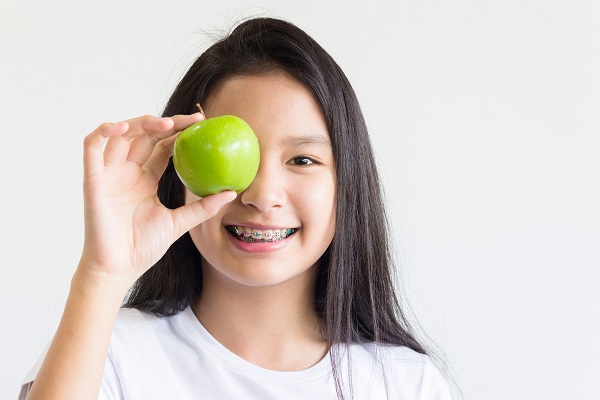



Braces are a great way to gain an attractive smile, ensure your keep good oral health and have more confidence each and every day. However, the quality of the results, in many instances, is largely dependent on how well the patient cares for the braces and their oral health during treatment.
How to eat with braces
Braces require many people to alter their diet, and there are certain foods that may become off limits during treatment. It is important to have a full understanding of what foods to avoid and what foods are more recommended with braces, and the following is a complete overview of how to eat properly when living with braces.
What to eat
Ideally, it is best to stay with softer foods that do not contain a high level of carbohydrates. In order to do so, making small adjustments to your meals may be required, such as not adding nuts to your salad and limiting your intake of sugar. A few examples of foods that are good to eat with braces include dairy products such as eggs and yogurt, bananas and cooked vegetables. It is also important to keep in mind that eating is likely to be the most challenging after the wires are adjusted since there is likely to be more pain during this time. Subsequently, foods such as mashed potatoes, peas and soup might make for great options until the pain goes away.
What not to eat
Perhaps the more important question is what you should not eat when wearing braces. Whereas eating soft foods is encouraged, avoiding harder foods or foods high in sugar is strongly encouraged. The reason for this change is because harder foods can damage brackets and the wire and result in the need for more frequent trips to the orthodontist for treatment. Common foods to avoid when wearing braces may include but not be limited to hard candy, chewy foods, popcorn, ice and hard fruits and vegetables. Making the necessary accommodations to your diet may require cooking foods to soften them, switching out apples and other hard fruits for bananas and cutting out as much sugar as possible.
How to care for braces
Of course, one of the best ways to ensure braces are well-cared for is to make the necessary changes to your diet, but there are other important things that should be done to ensure the braces remain in good condition and the teeth are healthy. In addition to dietary changes, be sure to practice good oral hygiene by brushing, flossing and using mouthwash consistently, frequently check for any signs of oral health complications or issues with your braces and visit the orthodontist for all scheduled check-ups and treatments.
Talk to an orthodontist today
If you want to learn more about braces and determine whether they are right for you, get in touch with us today and schedule a time to come in to see us. We can guide you through the entire braces process and help you maintain good oral health throughout treatment.
Are you considering braces in the Stockton area? Get more braces information at https://www.brooksideorthodontics.com.
Check out what others are saying about our services on Yelp: Read our Yelp reviews.
Recent Posts
Night guards are dental appliances designed to protect teeth from grinding or clenching during sleep, a condition known as bruxism. While over-the-counter options are widely available, custom night guards prescribed by a dental professional offer greater comfort, durability, and effectiveness. For many patients, investing in a custom night guard provides long-term benefits for both oral…
Many of us have likely had or know someone who has had corrective braces for crooked or misaligned teeth. However, there are many more types of teeth-related issues that braces may treat.Let’s examine how braces can be used to correct an alignment issue known as an overjet, including what exactly an overjet is, how it…
An orthodontist has various treatments to help patients achieve a straighter smile. While it is possible to get orthodontic treatment from other dental providers or even online, choosing a specialist like an orthodontist to guide your treatment can be the safest, quickest, and most comfortable route. Understanding why orthodontist-led treatments are the preferred choice for…
You may have seen someone wearing ceramic braces without even knowing it. These are most well-known for their discreet appearance and are ideal alternatives for patients who are concerned about how noticeable their braces would look. Read on to learn more about why ceramic braces are trusted among orthodontic professionals.Ceramic braces are among the most…


